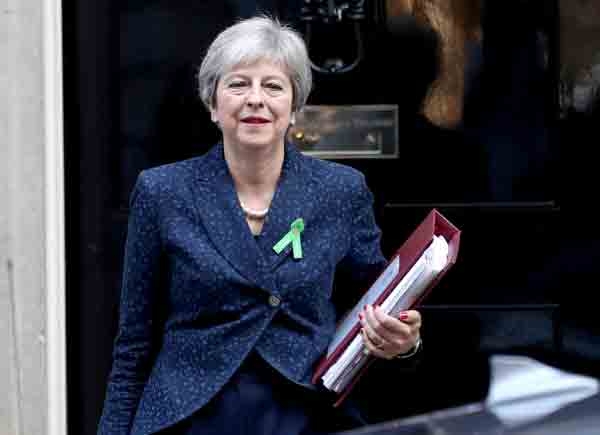Britain's May confronts EU leaders amid Brexit crisis

Britain’s Prime Minister Theresa May faces a Brexit showdown with frustrated EU leaders Wednesday with talks on agreeing an orderly break-up at an impasse.
This week’s summit in Brussels was billed as a “moment of truth” for negotiations on Britain’s exit from the bloc – but it seems the truth is that the two sides just cannot agree.
“Tomorrow I am going to ask Prime Minister May whether she has concrete proposals on how to break the impasse,” EU president Donald Tusk declared.
But May, hemmed in by opponents in her own party and even in her own cabinet, has no such proposals.
“The prime minister set out her position and where she thinks the negotiations are yesterday,” a Number 10 spokesman said.
Even the choreography of Wednesday’s summit opening emphasises British isolation. May will brief her 27 colleagues, then they will leave to discuss Brexit over dinner without her.
Tusk has made it clear that if May and EU negotiator Michel Barnier do not offer signs of concrete progress towards a draft deal he will not call a November summit to sign it.
Instead, the whole circus could either be pushed back to December or – formerly seen as taboo – the EU could use the November weekend to meet on preparations for a “no-deal” Brexit.
Previously, both sides had agreed that Britain crashing out of the Union on March 29 next year with neither a divorce agreement nor a road-map to future ties would be an economic and diplomatic disaster.
But, after Britain’s refusal to accept an indefinite legal “backstop” to prevent the return of a hard border between Northern Ireland and the Irish Republic, doubts are mounting.
“I think we are quite close to a no-deal,” warned Konrad Szymanski, the Polish minister for European Affairs after a pre-summit meeting with his European counterparts in Luxembourg.
Back in Brussels, a stern Tusk said: “We need something really creative to protect our values, to protect our single market. For this we need a new method of thinking.”
But Tusk conceded he had “no grounds for optimism” based on a report Tuesday from Barnier and May’s appearance in parliament on Monday.
The main disagreement between London and Brussels is on how to keep the Irish border open after Brexit, but May is also fighting with her own MPs, who must ultimately approve the final divorce deal.
At a three-hour cabinet meeting on Tuesday morning, which included ministers with reservations about her strategy, May said a deal was possible if they all stood together.
“I’m convinced that if we as a government stand together and stand firm, we can achieve this,” she said, according to her spokesman.
Arriving in Luxembourg to brief EU ministers, Barnier said: “We’re not there yet.”
“We need more time to find a comprehensive agreement,” he said. “We are going to take this time calmly, seriously to reach this comprehensive agreement in the coming weeks.”
Addressing MPs in the House of Commons on Monday, May had said a deal was “achievable” while sticking to her principles on the Irish border issue.
But a senior European official said the speech had only underscored for Barnier the uphill struggle he faces to get an agreement.
To solve the Irish question, Britain has proposed staying aligned to the EU’s customs rules until a wider trade deal can be signed that avoids the need for any frontier checks.
But her own eurosceptic Conservative MPs are demanding this “backstop” arrangement be time-limited, something the EU will not accept.
May said the EU was also insisting on its own “backstop” in case the London proposal did not work, which would see Northern Ireland alone stay aligned to the customs union and single market.
She says this would threaten the integrity of the United Kingdom – and it is strongly opposed by her Northern Irish allies from the Democratic Unionist Party (DUP).
Leo Varadkar, prime minister of Ireland, said a no deal scenario was “unlikely“, but added his cabinet had discussed preparations such as hiring customs officials for ports.-- AFP
